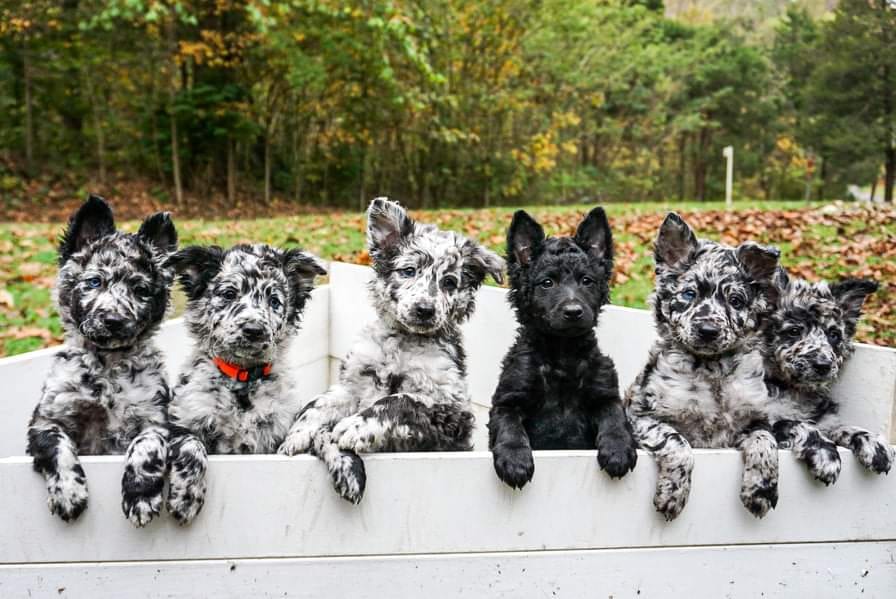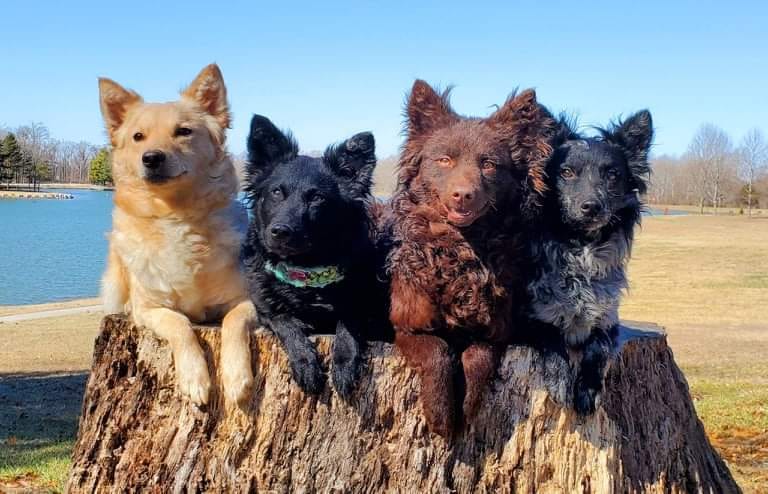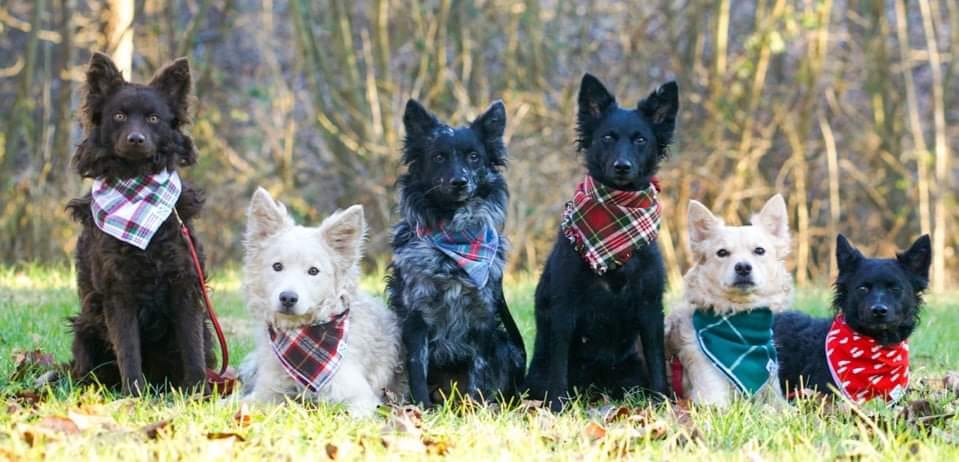“Sziasztok!” to the Mudis
by Jessica Freni
photo: Kayla Stigler
The Herding Group will soon (January 2022) add the Mudi (Mudik is the plural generally reserved for the country of origin’s native tongue, whereas in North America it is typically Mudi or Mudis). A unique, versatile and vocal dog from Hungary originally bred to be a sheepdog and multipurpose working farmer’s dog wearing many hats- driving herds, exterminator of vermin, guardian, even working cattle or tracking! The Mudi has a coat from curls to “swirling waves” in the colors of black (fekete), yellow (fako), white (feher), black merle (cifra), gray (hamvas), and brown (barna) in a range of shades for a very striking dog (https://www.mudi.us/coatscolors.html). Primary home interests are performance/sport (and companion pets) with the most common color being black and the most popular color is merle.
photo: Kayla Stigler
I spoke to some mudi owners, breeders and enthusiasts about this clever, chatty dog gaining interest in AKC and North America where it is still rare. Owner, Sheneé Ruiz, is working on establishing a breeding program here in the US and describes the breed as,
“Mudi originate from Hungary and were primarily used by those that relied on Racka sheep and other livestock for their income (and some are still used for this purpose) – therefore it’s not surprising that some would have a sharp temperament with a splash of reactivity.
photo Natasha Veer
Recently, we are starting to see some friendlier temperaments (as they are being bred for), but it is still a work in progress.
There is a great deal of diversity within Mudi temperament. Mudi range from medium – high energy and medium – high drive, this can also vary within a litter. Aloofness with strangers can also range – some are fearful to varying degrees, whilst others will approach strangers for affection. Their off switch is sometimes natural, other times need to be trained.
Although not every Mudi is vocal, a great deal of them are. They like to tell you all about their day and will use a myriad of noises to do it – barking, purring, and grumbling. I love to hear them play because ALL the noises come out and it’s truly endearing (at least for me – I can’t speak for everyone).
photo Natasha Veer
Typical to most herding breeds, they can be soft to corrections and can vary from independent to velcro. They do best with short burst training sessions, repetition is not desirable for the average Mudi. But sometimes repetition is key to their development, like with socialization. Socialization is paramount, preferably daily, for their first year of life (and maintained thereafter). Their fear periods can be intense and sudden, they can go from the puppy you adore to a feral honey badger seemingly overnight. Working through them takes patience and persistence.
Shedding varies within the breed. Some will shed minimally throughout the year, whilst others will blow coat a couple times a year. The coat is wash and wear, most bathe them as necessary or if they’re dirty prior to a show – it all comes down to if your Mudi has bathed themselves in mud or rolled in something dead. Brushing Mudi is also as needed, namely when they shed.
The primary health concerns within the breed would be hip dysplasia, patella luxation, epilepsy, thyroid conditions, and CDA (some of the dilute pups are affected). Some other concerns (though not as prominent) would be elbow dysplasia, heart conditions, eye conditions, teeth – missing/fused, spondylosis, follicular dysplasia, and allergies.
Something that is becoming more common is interest in Mudi for sport or service dog work:
To address SD work, myself and several others involved in the breed do not believe this is a breed that should be utilized for that purpose. Mudi temperament does not typically match what is needed for SD’s – they can be reactive, shut down under pressure, and ordinarily feed off the emotions of their handler. Will every Mudi be like this? No. But for the SD handler and emergency staff that may need to assist the handler, it is not worth the risk if you need reliable medical equipment.
For performance sports, there are several Mudi that compete in a slew of venues! As aforementioned, there can be some hurdles to them being a performance prospect: Environmental sensitivity, dislike repetition, reactivity, easily bored, not always driven…you could purchase a prospect for agility, but end up with a dog that has a propensity for scentwork. Some do not fill the mold that you purchase them for, and that is something you should be prepared for with this breed. Get a Mudi because you love Mudi’s, not because you want a sport dog.”
Natasha Veer, Roka Mudis, echoes this breed synopsis and adds, “Temperament varies across the breed as its currently not very refined. In general, as a whole, a Mudi feels very much like your typical quirky herder… but, with a bit of terrier and something primitive tossed into the mix.”





